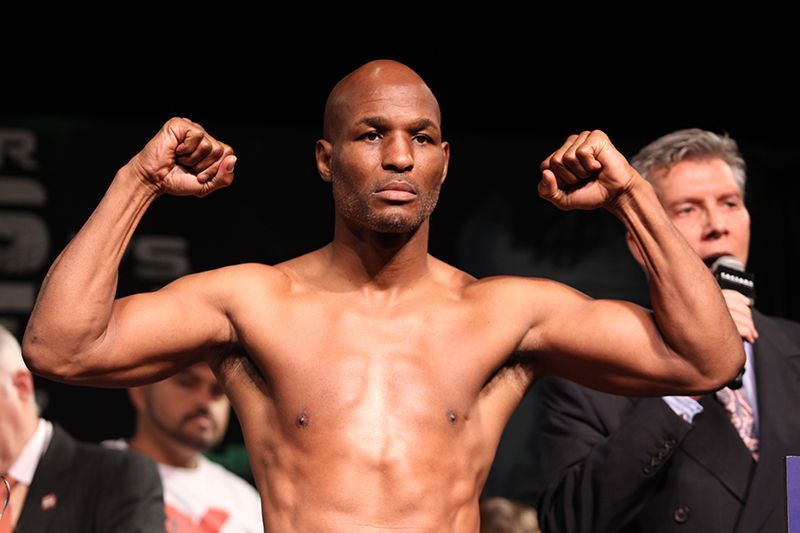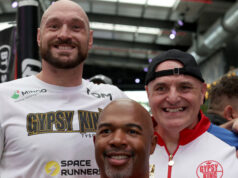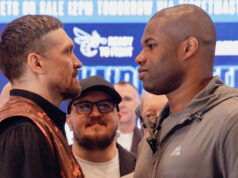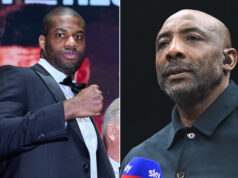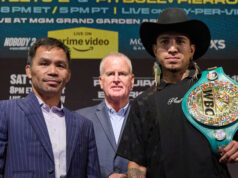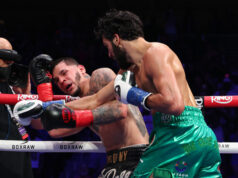With Bernard Hopkins’ one-sided loss on Saturday night to Sergey Kovalev, the conversation amongst many almost immediately turned to his future. In a way, it was easy to feel bad for Kovalev, who probably deserved more of the spotlight following his dominant win, but it was clear that this night was always going to belong to Hopkins, win or lose.
Kovalev will undoubtedly move onto bigger and better things, including potentially the much sought after fight against Adonis Stevenson. Whether or not that comes to pass, the future for Hopkins remains far murkier. While he characterized his future as “50-50” following the fight, the reality is that while any future wins could further solidify his legacy, any additional losses could have a detrimental effect.
Why Hopkins Should Continue Fighting
The case for Bernard Hopkins continuing to fight is fairly simple. He has continued to beat the odds, even as writers and pundits have forecast his demise, again and again. Even before Saturday night, in a fight which I expected him to lose, there was a small part of me expecting Hopkins to prove me wrong.
Even as I write this column, I realize the arrogance of my suggestion that Hopkins should retire. I probably could and would have written the same thing after his back to back losses in 2005 to Jermain Taylor, his UD win over Roy Jones, Jr. in 2010 in what may have been one of the worst fights I have ever seen.
The foremost reason why Hopkins would not retire is because it is in these circumstances that he has produced his most memorable moments. He has made a career out of proving people wrong, and succeeding when people thought he could not.
Hopkins has also been able to attract a considerable amount of attention from casual fans of the sport who are drawn to the remarkable nature of a man at the age of 49 competing at the highest level of the sport. Unfortunately, it is many of these same casual fans who get excited about watching a Hopkins match, only to bemoan the lack of action in the fight afterward.
The majority of Hopkins’ fights in the end of his career have indeed been “boring” because the ways in which he has been able to defeat his opponents have been just as much mental as physical. Hopkins knows exactly what type of fight his opponent is going to bring, and is among the most well prepared fighters in boxing. Even despite this steadfast dedication to his craft, however, the fight against Kovalev on Saturday proved that having the superior mind in the ring can only go so far.
Why Hopkins Should Retire
While it is easy to understand the reasons why Hopkins would choose to continue his legendary career, the case against his continuing is even stronger. Incredible as the recent renaissance in his career has been, there has always been the possibility that any fight would be his last.
Following his first fight against Chad Dawson, I remember feeling as though it might be the end, a feeling which was only solidified during his loss in the rematch. That he has been able to come back from this and other losses in the way that he has is remarkable, and is the primary reason for his popularity. With any additional losses, however, what is currently seen by most as a George Foreman-esque late-career renaissance might instead be construed as the same sad story of a fighter continuing too far past their prime, more similar to Evander Holyfield.
Hopkins was defeated by Kovalev in even more dominating fashion than he had been by Dawson, and unlike the first match with Dawson, there is no possibility of a rematch. Saturday proved very convincingly that even though Hopkins still has his wits about him and can get the best of fighters like Tavoris Cloud and Karo Murat, he is now a pretty significant step down from the elite of the division.
I also have no reason to believe that a fight against Adonis Stevenson would go any differently than the Kovalev fight did. In bringing the division titles one step closer to unification by having the guts to take on a fight against Kovalev, Hopkins has done a service to the sport, but the fact of the matter is there is nothing more to gain from his continuing to fight.
What Bernard Hopkins has been able to do in his career past the age of 40 is nothing short of incredible, and when he finally does retire, his legacy will be marked more by what he has been able to accomplish near the end of his career than what he achieved during his prime. With every new fight, however, that legacy could be tarnished.
Especially in recent years, Hopkins has been so successful not only because of his superior training, but also because of his superior mind. For the sake of his legacy and his outstanding contributions to boxing, I hope that his mind will realize that it is finally time to hang up the gloves.


